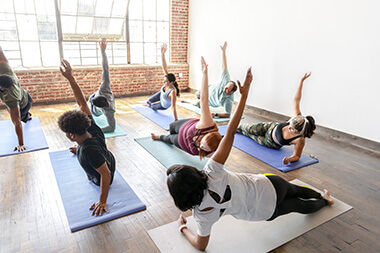Exercise And Mental Health Benefits
We are all well aware of how exercising regularly helps us physically, but what about the benefits of exercise for mental health?
In this article, we’ll take a look at the mental benefits of physical activity and find out why fitness makes us feel so good.
How Often Should We Exercise For Mental Health Benefits?
The NHS recommends that adults should aim to get at least 150 minutes of exercise every week to stay healthy and alleviate common mental health issues such as depression.
A recent study looking at the benefits of exercise for mental health, found that individuals who engaged in exercise had 43 per cent less self-reported poor mental health days than those who did not. However, despite the proven benefits, statistics show that only 68 per cent of men and 64 per cent of women in the UK meet the daily recommended physical activity levels.

Why We Should Exercise For Our Mental Health
There’s a great sense of achievement when you commit yourself to an exercise routine and begin to reap the physical benefits that come with it.
Lower blood pressure, a stronger physique, better energy levels, or whatever it may be. One thing is for certain, we all know exercise is good for our health and appearance. But it’s not all about the cardiovascular capabilities and muscle density.
Most people who exercise regularly tend to do so because it gives them an enormous sense of well-being and happiness. You feel more energetic throughout the day, sleep better at night, feel better about yourself and form a stable routine.
In fact, results from our recent customer survey indicated that 42% of our customers recognise the importance of mental fitness as this was the main motivation behind them exercising.
Common mental health problems include:
- Depression
- Anxiety
- Stress
- Dementia
- OCD
- Bipolar disorders
- Schizophrenia
- PTSD
Additionally, exercise reduces conditions such as bad moods, grief, relationship problems and addictions.
How Exercise Improves Our Mental Health
When you approach exercise with the right mindset it can have a significant improvement on your mental health. However, it’s important to know that not only people who suffer from mental illnesses will experience benefits — exercise is helpful for everyone!
The following 5 ways will give you a better understanding of the mental benefits of physical activity, how it can help you overcome barriers and underlying beliefs, gain balance back, and achieve more in your day-to-day life.
#1. Heal Your Mind And Body
When you work out, instead of just focusing on the physical benefits, use it as a chance to relieve any built-up stress or tension you might have. When we exercise our brains release feel-good chemicals called endorphins and dopamine which can really help to blunt anxiety. Many experts also claim exercise leads to an increase in nerve cell growth helping to reduce symptoms of depression.
#2. Increase Motivation
Exercise requires motivation. Even the most hardcore fitness fanatics have their bad days when nothing seems worse than having to lace up those running shoes and get out the door. But it’s in moments like these that motivation is built.
A great way to build motivation is to record your workouts, mix in some variety, and stay consistent. In doing so you will be turning exercise from a monotonous task, into something that’s exciting and more enjoyable. Remember to build motivation we must first get some momentum going. Only then can improvements be made.
#3. Boost Your Self-Esteem
Suffering from mental health issues often leads to problems such as low self-esteem. Regular exercise will undoubtedly change your body in a physical way and as a result, confidence grows. With this newfound confidence, your self-acceptance and self-esteem will improve leading to a more positive outlook on life.
#4. Make New Neuro Pathways To Exercise
What thoughts do you currently link to exercise? Ask yourself this question. If you find that you’re being met with dread every time you think of jumping on the treadmill or heading outside for a brisk walk, then it’s time to reevaluate.
Instead, try and think of every benefit possible that exercise will bring into your life. For example, if you tell yourself jumping on that treadmill will result in you feeling 100 times better 30 minutes from now, instead of its going to take a lot of time and effort to warm up and stretch beforehand, then you will have built a positive neuropathway in your brain to that particular exercise.
Each time you go to workout, repeat this process always thinking of the benefits to be gained. Over time you will have built up a strong mental fortitude that will see you looking forward to every workout in the future.
#5. Have A Long-Term Goal
To ensure your mental health remains in a favourable state you must establish some long term goals for your fitness. Having a strong mental fortitude is the key to living life to the fullest and working out for more than just the physical benefits will cement this ideology in place.
When you realise that every time you work out you’re helping to overcome mental illness and keep it at bay, then establishing long term goals should come easy.
What Is The Best Type Of Exercise For Mental Health?
To start that blood circulating in the brain and your dopamine levels fired up, you need to get your body moving. This doesn’t necessarily mean slogging away in the gym, you can obviously do that if you prefer, but it’s good to know there are other ways to get active and boost your mind.
Cardio Based Exercise
Running, walking, jogging, using the cross trainer, cycling, swimming, burpees, basically any rhythmic, aerobic exercise you can think of is known to have the most improvements on your mental health.
These exercises all tend to work up a sweat and get you breathing that little bit harder. But afterwards, you will find that your mind becomes clear and your body overall feels better. A good example of this is the ‘runners high’ many people that run frequently experience.

A huge benefit of cardio-based exercise is that it can be performed outdoors. This is commonly known as ecotherapy and research shows that it can be extremely powerful in treating depression and anxiety.
An old Japanese practice called Forest Bathing is one such form of ecotherapy that’s purpose is to get you to reconnect with nature by spending time in it. It’s a mix of both fitness and mindfulness and can be as simple as taking a walk in any natural environment and consciously making connections with what’s around you, after all, when we get closer to nature we do our overstressed brains a favour.
Resistance Training
Overloading your muscles with resistance training is going to help improve your physique and overall appearance which goes hand in hand with greater self-esteem. To quote the famous french footballer Thierry Henry “When you look good you feel good, and when you feel good you play good.”
The same principles apply to your life when you begin to progress with resistance training and your appearance takes on a new shape.
Furthermore, research shows that people who suffer from sleep disorders which are directly linked to many mental health conditions such as depression have seen a 30 percent improvement in sleep from a regular resistance training program.
High-Intensity Interval Training (HIIT)
HIIT or high-intensity interval training is a great way of working out when you gain some experience and want to switch up your training style. The way it works is you perform all of your exercises in short time-frames at the most effort possible followed by slightly longer rest and recovery periods.
When you do HIIT workouts regularly, you will find that your energy levels throughout the day increase, you sleep better at night, and you can cope with stress more easily. This happens because cortisol, the primary stress hormone in your body gets released every time you workout and your body becomes better able at handling it.
Yoga
Balancing yin and yang to create better health and wellbeing are the principles of most types of yoga. But when used to consciously improve our mental health, yoga is perfect because it helps us integrate body and mind together.
Yoga is like a physical form of meditation where you will focus on your breathing to bring yourself into the present moment while also causing a response from your nervous system to help you calm down, all while working on your bodies flexibility and posture.

Doing yoga causes your brain to become sharper and develop new cells. As a result, your brain gets stronger which directly relates to better memory, attention and awareness. It’s like weightlifting for your mind!
Studies also suggest that people who regularly perform yoga have seen less of a decline in age-related memory and cognitive skills as opposed to those who did not.
Swimming
Swimming is a good all-around exercise because it takes impact stress off your body, allows you to build muscle and endurance, and correspondence to maintaining a healthy weight. There’s also something very therapeutic about just getting in the water.
Going for an early morning swim is a great way to start your day off in a positive manner, or vice-versa an evening dip can help you wind down after a long day at work.
Apps For Improving Your Fitness and Mental Health
There are many great fitness apps and technologies available today that provide you with a large range of options besides regular run of the mill exercises and stat tracking.
You’ll find that a lot of these apps have mindfulness activities built into them designed to help boost both your fitness and mental health, so you can live a healthier, happier life.

Mindfulness is known to be the perfect tool for anyone who exercises as it’s easy to learn and simple to apply. It can help strengthen motivation, increase focus, improve resilience, enhance form, optimize recovery and, perhaps most important of all, get us out of our head and into the body for an enjoyable and fulfilling training session.
Headspace
Headspace is a very popular meditation app that has a category called ‘move.’ It focuses on training your body and mind at the same time with exercises that help strengthen your mental and physical well-being.
Nike Run Club
Popular sports brand Nike has released the Nike Run Club app that aims to give you guidance and inspiration to become a better version of yourself while having some fun along the way.
Interestingly though, Nike has recently partnered up with headspace to serve the complete holistic needs of their athletes. They believe that training mindfully will ensure an athlete is preparing, performing and recovering in the most efficient and effective way possible.
Nike brings this tool to its members so they go into their next workout with a calm and clear mind by:
- Audio guided mindful runs — in addition to getting effort-based running instruction, you’ll also learn how to unlock strength and peace from within. It takes traditional sitting meditation and transforms it into being active and upbeat. You get coached in a way that makes you feel more in control of your run, your outlook on running and even your life.
- More effective training sessions — Learn how to block out distracting thoughts to gain more awareness and focus. By doing this you will be able to experience the full health benefits of a workout which ultimately result in a healthier happier you.
- Use the same mindfulness techniques as the pros — get help approaching and reacting to negativity differently by incorporating mindfulness into your life. It’s like using your mind as another muscle to power your body toward your goals.
Want to know more about this app? Read our Nike Run Club review
Apple Fitness +
Apple Fitness + is an app that makes it very easy for everyone to work out and be more mindful. It offers 11 different workout types with everything from strength training to yoga. Measurements in real-time metrics help to keep your motivation up. There are also over 25 new guided audio and video meditation sessions added every week with each one focusing on a specific theme, such as calm, gratitude, or kindness, with Fitness+ trainers as your guides.
This is just an example of three of the most popular fitness apps that integrate with mindfulness activities.
Summary
Fitness is a key component to having better all-round health. When the right exercises are performed regularly and incorporated with proper mindfulness techniques, it can be used as a way to improve both our physical but just as importantly our mental wellbeing. Something as simple as changing up your thought process before exercising or downloading a new app to introduce mindfulness to your workouts may be all you need.
The main thing to remember is exercise and mental health complement each other to the fullest, and that if you work out with this in mind, you are sure to improve the quality of your life.
Want more exercise and mental health advice? Sign up for our monthly emails.





